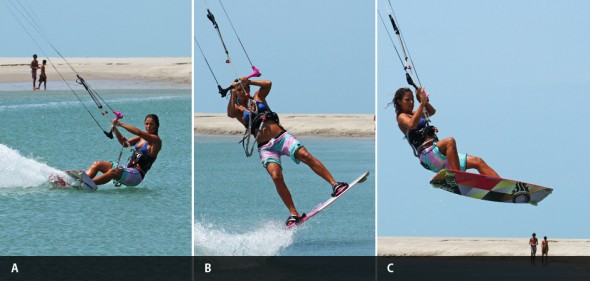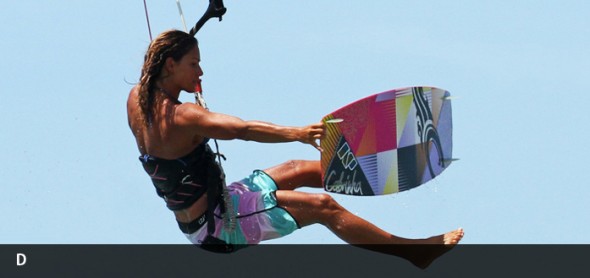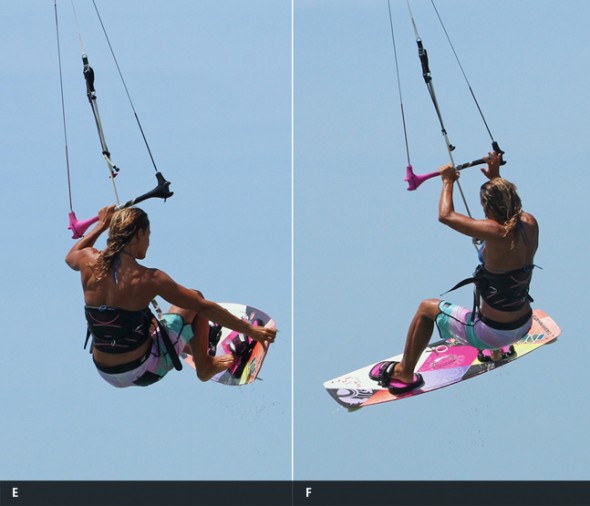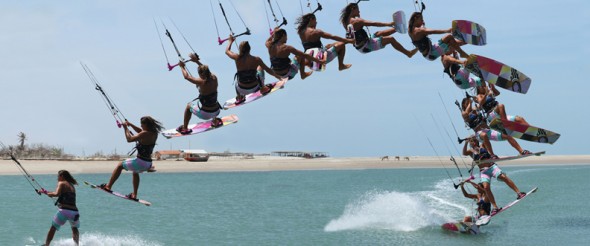Back Loop One Foot
Kite surfing is an grand sport and also proven one of the best exercises for your body & your mind. Being a pleasurable, social sport, kitesurfing can increase your levels of health and fitness with no doubts.
Hopefully you did your boned back loop grab homework! Here is the natural progression, once again based on the humble sent back loop, grabbing the tail but adding a stylish one foot into the equation!
The Approach Pic A.
To have the time in the air to get a foot out and still land you’ll need to perform a dos, and floaty back rotation. Approach wise you need to be coming in on a good edge with the kite parked at either 11 or 1 o’clock. Get your weight back by extending your front leg and dropping your bum over the back foot, whilst still resisting. You can see that the rider is low to the water and edging hard upwind. From here she can send the kite aggressively with both hands for a decent floaty jump.
The take off Pic B
This part will really decide how much time you’ll have and how slowly you’ll rotate. Having sent the kite hard against a good edge the lift from the kite should come early, once the kite is around 12 o’clock. As soon as the rider feels the pull she stamps up off her back leg, extending her entire body up in a popping motion and simultaneously pulls the bar in, both for extra lift and to stop the kite moving any further back in the window. By popping up the rider is carving up into her rotation but she isn’t turning further into wind and therefore she won’t spin uncontrollably. All the while the rider keeps her head looking forward through the bar, again making sure that she doesn’t rotate quickly so that the grab and one foot will be simpler.
Go Early Pic C.
Just the same as the grab, you must go early, but only after you have extended up into the rotation.
As soon as she has left the water she is looking for the grab and already bringing her back foot up towards her extended back arm. The earlier she gets hold of the board, the more time she’ll have to grab and concentrate on getting around smoothly and landing softly! Go for the grab just as you have practiced so whether you grab the heel side edge of the board or the actual tail doesn’t matter, whatever feels comfy and natural.
Slip It Out Pic D.
It will be easier to get your foot out if you have the board edge up, as opposed to flat.  This way gravity will help and with the smallest of encouragement you should be able to get your pinkies free. You can see that the rider is still looking at the board, she looked for the grab and then focused on the foot strap so that she can see what she is doing and this also has the added benefit of keeping her head from looking over her shoulder, and thus keeps her rotation slow, giving her plenty of time for the one foot. The rider can now hold the board up whilst she pulls her foot out and down, easily releasing it from the strap. If the board is held flat it will be harder as you will have to pull your foot out towards you, which requires more flexibility or longer arms. On your first attempts aim just to get your foot out onto the pad. Once you’re confident you can extend your leg, pushing your foot down towards the water for extra style and look at me points. Final point to ponder here is that even though the rider is flying the kite with one hand, she still has the bar pulled in. This gives her support and float, whilst keeping tension on the lines, meaning that the kite is ready for the eventual landing.
This way gravity will help and with the smallest of encouragement you should be able to get your pinkies free. You can see that the rider is still looking at the board, she looked for the grab and then focused on the foot strap so that she can see what she is doing and this also has the added benefit of keeping her head from looking over her shoulder, and thus keeps her rotation slow, giving her plenty of time for the one foot. The rider can now hold the board up whilst she pulls her foot out and down, easily releasing it from the strap. If the board is held flat it will be harder as you will have to pull your foot out towards you, which requires more flexibility or longer arms. On your first attempts aim just to get your foot out onto the pad. Once you’re confident you can extend your leg, pushing your foot down towards the water for extra style and look at me points. Final point to ponder here is that even though the rider is flying the kite with one hand, she still has the bar pulled in. This gives her support and float, whilst keeping tension on the lines, meaning that the kite is ready for the eventual landing.
Back In Pic E.
At first keep your back foot close to the strap when you take it out. This way you can literally pull your foot out and leave it resting on the pad, so to get it back in you just need to push it. As you gain confidence start to extend your back leg once you have taken the foot out take the foot so that it is more obvious. You’ll need to keep your eyes on the prize,  so watch the strap and aim your foot back in. Once your toes are in, use your grab and push your foot and/or pull the board to make sure that your foot is properly in.
so watch the strap and aim your foot back in. Once your toes are in, use your grab and push your foot and/or pull the board to make sure that your foot is properly in.
This is not essential but it will make the landing considerably easier. If only your toes are in you’re more likely to trip over your toe side edge when you land.
The Grand Finale Pic F.
Once you have your foot safely back in the strap it’s all about preparing and conquering the landing. Your first job is to make sure that you finish the rotation, so turn your head and look towards your potential landing zone, which should be in front and downwind of you. Don’t be tempted to look too far around as this will encourage you to over mists. Job number two is to get two hands on the bar so that you can comfortably pull the bar in and dive the kite, which will both pull you out of the rotation and pull you downwind for your landing. You can see that the rider is looking downwind whilst reaching up for the bar. From here on in she’ll dive the kite and land with the board facing down wind, claiming the one foot.
Top Tips
- Assuming that you’re happy with your slow rotation the most important part to concentrate on is getting the grab early.
- If you do, then you will have more time to get the foot out and then back in.
- Do concentrate on looking at the foot strap to get your foot out; making sure the board is edge up.
- Finally do wiggle your back foot out of the strap a little before you take off, or even loosen the strap so that it is easy to slip in and out.
- Now have a good look at the Sequence and the get the grab early and don’t use your head. Videos for a full step by step guided tour.
Common Problems
- Most of the potential problems will be the same as for the grab, so over rotating or flying the kite forward too much when you grab.
- If it’s not working make sure that you take off up into your back rotation, If the kite pulls you forward in the air, causing you to lose balance, land nose heavy or crash, send it a bit more for the jump so that you’re flying with the kite just behind 12 o’clock.

Keystones
- Good solid edge with back leg resisting
- Send kite positively
- Pop up into the back roll
- Grab early and tilt the board edge up
- Look at strap to get foot out and in